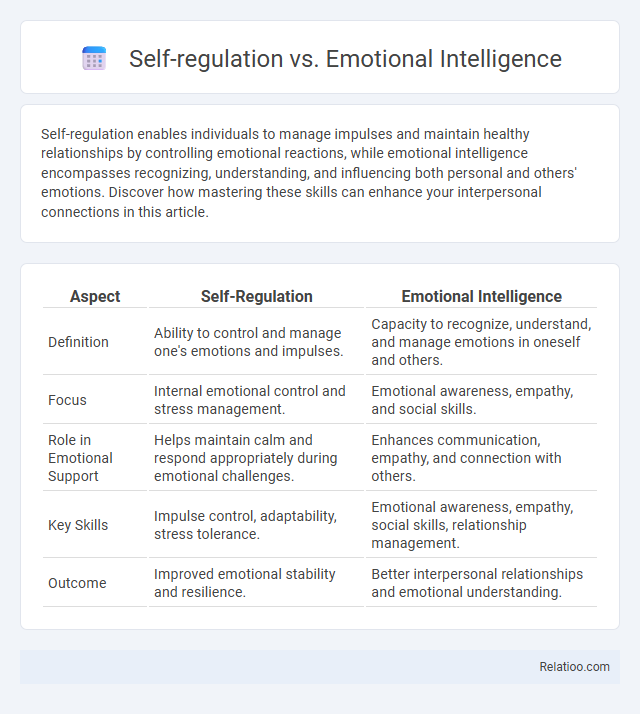Self-regulation enables individuals to manage impulses and maintain healthy relationships by controlling emotional reactions, while emotional intelligence encompasses recognizing, understanding, and influencing both personal and others' emotions. Discover how mastering these skills can enhance your interpersonal connections in this article.
Table of Comparison
| Aspect | Self-Regulation | Emotional Intelligence |
|---|---|---|
| Definition | Ability to control and manage one's emotions and impulses. | Capacity to recognize, understand, and manage emotions in oneself and others. |
| Focus | Internal emotional control and stress management. | Emotional awareness, empathy, and social skills. |
| Role in Emotional Support | Helps maintain calm and respond appropriately during emotional challenges. | Enhances communication, empathy, and connection with others. |
| Key Skills | Impulse control, adaptability, stress tolerance. | Emotional awareness, empathy, social skills, relationship management. |
| Outcome | Improved emotional stability and resilience. | Better interpersonal relationships and emotional understanding. |
Understanding Self-Regulation: Key Concepts
Understanding self-regulation involves mastering the ability to manage your emotions, thoughts, and behaviors effectively, which is essential for emotional intelligence and overall mental well-being. Emotional intelligence encompasses self-regulation as a core component, allowing you to respond to stress, control impulses, and maintain focus under pressure. Developing self-regulation skills enhances your capacity to adapt to changing situations and improve interpersonal relationships.
Defining Emotional Intelligence: Core Components
Emotional intelligence comprises self-awareness, self-regulation, motivation, empathy, and social skills, forming the foundation for managing emotions and interpersonal relationships effectively. Self-regulation, a core component of emotional intelligence, involves controlling impulses and adapting to changing circumstances, essential for emotional balance and decision-making. While self-regulation focuses primarily on controlling one's internal state, emotional intelligence encompasses a broader spectrum of competencies that influence both personal and social functioning.
Self-Regulation vs Emotional Intelligence: What’s the Difference?
Self-regulation is the ability to control one's emotions, thoughts, and behaviors in different situations, enabling adaptive responses and goal achievement. Emotional intelligence encompasses a broader set of skills, including recognizing, understanding, and managing one's own emotions and those of others. While self-regulation is a core component of emotional intelligence, emotional intelligence also involves empathy, social skills, and emotional awareness beyond self-control.
The Role of Self-Regulation in Personal Success
Self-regulation plays a critical role in personal success by enabling individuals to control impulses, manage emotions, and stay focused on long-term goals. Emotional intelligence complements self-regulation by enhancing awareness and understanding of one's own feelings and those of others, facilitating better decision-making and relationship management. Together, effective self-regulation and emotional intelligence foster resilience, adaptive behavior, and sustained achievement in both personal and professional domains.
How Emotional Intelligence Impacts Relationships
Emotional intelligence plays a crucial role in enhancing your relationships by enabling better understanding and management of both your emotions and those of others. It fosters empathy, effective communication, and conflict resolution, which significantly improve interpersonal connections. Self-regulation, as a component of emotional intelligence, helps maintain emotional balance and respond thoughtfully in social interactions, strengthening trust and cooperation.
Neural Mechanisms: Self-Regulation and Emotional Intelligence
Neural mechanisms underlying self-regulation involve prefrontal cortex activity responsible for impulse control and decision-making, while emotional intelligence is linked to the interplay between the amygdala and the prefrontal cortex, enabling effective emotional processing and regulation. Your capacity for self-regulation depends on the efficient communication between these brain regions to manage urges and maintain goal-directed behavior. Emotional intelligence enhances this process by promoting awareness and modulation of emotions, contributing to adaptive social interactions and psychological resilience.
Building Self-Regulation Skills: Effective Strategies
Building self-regulation skills involves developing the ability to control impulses, manage emotions, and maintain focus despite distractions. Emotional intelligence plays a crucial role by enhancing your awareness of emotions, which supports better decision-making and relationship management. Effective strategies include mindfulness practices, setting clear goals, and practicing delayed gratification to strengthen your self-control and emotional resilience.
Enhancing Emotional Intelligence: Practical Techniques
Enhancing emotional intelligence through self-regulation involves recognizing and managing emotions effectively to improve interpersonal skills and decision-making. Practical techniques include mindfulness practices, cognitive reframing, and stress reduction exercises that increase emotional awareness and control. Consistent application of these methods fosters resilience and empathy, strengthening both personal and professional relationships.
Real-Life Applications: Self-Regulation vs Emotional Intelligence
Self-regulation enables you to control impulses and manage stress effectively, enhancing decision-making and goal achievement in high-pressure environments. Emotional intelligence involves recognizing, understanding, and influencing your own emotions and those of others, which is crucial for building strong interpersonal relationships and resolving conflicts. In real-life applications, combining self-regulation with emotional intelligence allows for adaptive responses to emotional triggers, improving both personal well-being and professional interactions.
Integrating Self-Regulation and Emotional Intelligence for Growth
Integrating self-regulation and emotional intelligence enhances personal and professional growth by enabling individuals to manage impulses while understanding and influencing emotions effectively. Self-regulation provides control over reactions, whereas emotional intelligence offers the ability to perceive and adapt to emotional dynamics in oneself and others. Combining these skills fosters resilience, improved decision-making, and stronger interpersonal relationships crucial for sustained success.

Infographic: Self-regulation vs Emotional intelligence
 relatioo.com
relatioo.com